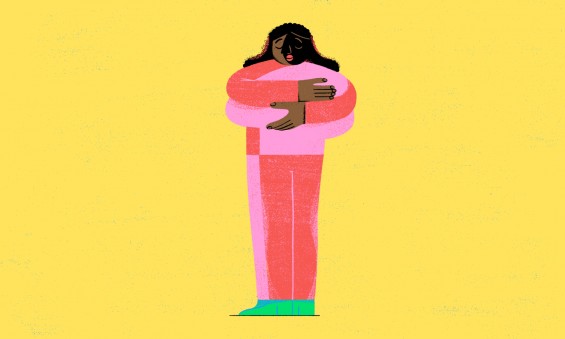
How to support a friend or family member who’s struggling with their mental health
Every one of us has mental health in the same way that every one of us has physical health.
Yet despite the prevalence of mental health struggles, there is still so much stigma around them. Worldwide the leading cause of disability is depression, according to the World Health Organization, and in the US alone, nearly 1 in 5 of adults lives with a mental illness.
As a mental health therapist-in-training and the founder of Brown Girl Therapy, the largest mental health community for children of immigrants living in the West, I regularly get asked this question: “How can I support a loved one who is struggling with their mental health?” With the multiple crises we’re currently living through, it can feel like more and more people we know are currently hurting.
Maybe you’ve noticed that a friend’s behavior or demeanor has changed and you’re concerned, or a family member is opening up to you for the first time about their anxiety. I know it’s challenging to know what to say or do. Here are eight things that you can do and eight things you should not do when you’re supporting someone who is struggling with their mental health.
First, the dos:
DO listen and validate
Be curious about what your friend is struggling with and how it’s impacting them. Instead of asking yes-or-no questions, ask open-ended questions to allow them to share their experience with you — questions like “What’s going on?” or “How long have you been experiencing this?” or “How are you coping?”
When they respond, use validating statements that will help them feel heard and accepted just as they are. Many people who struggle with their mental health may often blame or judge themselves about what they’re going through; some may feel that their struggles aren’t valid because they’re all “in their head.”
Even if you can’t completely understand or relate to their feelings or experiences, you want to communicate to your loved one that they’re perfectly OK — this can be as simple as saying “That sounds really difficult”.
Support looks different for everyone, and what you may need when you’re struggling may not be what someone else needs.
DO ask what they need from you
Instead of making assumptions about what would be helpful to your loved one, ask them directly: “How can I support you?” or “What would be helpful to you right now?” Remember: Support looks different for everyone, and what you may need when you’re struggling may not be what someone else needs when they’re having a hard time.
DO offer to help with everyday tasks
A lot of people who struggle with their mental health may find it incredibly difficult to make basic decisions or perform even seemingly small chores. Instead of using the generic phrase “I’m here if you need me,” try to be specific about what you’re offering so your friend won’t have to bear the burden of reaching out or figuring out what they need in the first place.
If you visit them, take a look around and see what they could use assistance with — like doing the dishes, weeding, vacuuming or folding laundry. If you talk to them, offer to take them to a doctor’s appointment or do a grocery or drugstore run for them; you might also consider sending them a gift card for their meals.
DO celebrate their wins, including the small ones
When a person is struggling with their mental health, every day can be full of challenges. So cheer on their accomplishments and victories. This can help affirm their feelings of agency and efficacy. This could look like thanking them for being so honest and vulnerable with you or congratulating them for going to work or for taking their dog out for regular walks.
Many people who struggle with their mental health already feel a baseline level of guilt for being a drag on other people’s time, energy and mental space.
DO read up on what they’re struggling with
There’s another important burden you can remove from their plate: Having to teach you about mental illness. Instead, take the time to educate yourself on what they’re going through — for example, learning more about depression, panic attacks or anxiety — so you can understand their lived experience and be aware of severe or risky behaviors or symptoms to look out for.
Today, there are so many places online to find informative, helpful content, from peer-reviewed journals and articles by mental health professionals to posts in digital communities and personal essays by people who share in your loved one’s mental-health challenges.
DO check in with them regularly
Many people who struggle with their mental health already feel a baseline level of guilt for being a drag on other people’s time, energy and mental space. Consistently check in (a quick text is fine) with them, keep them company when you can, and remind your friend that you love them and you’re on their side.
DO recognize that not all mental health struggles look the same
Not all mental health challenges or mental illnesses look the same. Some people might struggle as the result of a specific event or circumstance, while other people may be living with a chronic mental illness. If the latter is true for your loved one, don’t expect them to “get over” it as they would with a flu or broken bone.
Meet them where they are, reminding them you understand it’s something they are living with. This can take different forms depending on what they need — this could mean understanding when they cancel plans on you because they’re having a particularly tough day or adapting your plans with them to reflect what they’re able to do.
It’s important we remove the stigma from taking care of our mental health and talk about it just like we’d talk about going to a physician for a physical illness.
DO normalize talking about mental health
Don’t wait for them to bring up their struggles, or shy away from being direct with them. It’s important we remove the stigma from taking care of our mental health and talk about it in the same way we’d talk about going to a physician or taking medication for a physical illness. You might even consider opening up and being vulnerable when talking about your own mental health so instead of feeling judged, your loved one feels safe being honest with you.
Now, the don’ts:
DON’T compare their experience to others
I really want to drive one point home: Everyone experiences their mental health struggles and mental health illnesses differently. In the guise of trying to make a loved one feel better, you may be tempted to tell them “everyone deals with anxiety [or depression etc] sometimes” or bring up an acquaintance who had the same illness but benefited from a specific strategy, treatment or therapy.
Resist this temptation. Even though saying those things can be helpful in terms of normalizing their experience and making them feel less alone, they can also have the unintended effect of pressuring them to get over it or minimize what they’re feeling.
Another thing to avoid — reminding them of what they have or should be grateful for. Toxic positivity and comparison to others can reinforce the narrative that your loved one’s problems aren’t important.
Avoid using stigmatizing words like “crazy” or “cuckoo”, or saying things like “that’s so OCD” or “take a Xanax”
DON’T use stigmatizing language
Be careful how you talk about mental health around your friend (and in general!). Avoid using stigmatizing words like “crazy” or “cuckoo”, or using clinical diagnoses or medications flippantly in conversation — like saying “that’s so OCD” when someone is very organized or telling someone to “take a Xanax” when you want them to calm down. Check your own assumptions surrounding mental health issues, professional mental health care and medication so you aren’t causing your loved one unnecessary pain.
DON’T take their behavior personally
People’s mental health struggles are often not linear or predictable. Maybe your friend is less talkative one day, and maybe your sister keeps rescheduling your phone dates. While you may feel hurt or offended by their actions, don’t automatically assume that they are reflections of how your loved one feels about you.
Instead, use their cues as moments to check in on them, ask what you can do to support them, and remind them that you’re here for them when and if they need.
You want to be with your loved one while they’re navigating their own struggles, not steering them or pushing them.
DON’T be confrontational or try to control the situation
When you’re faced with a loved one in pain or distress, it can be really difficult not to get in the metaphorical driver’s seat and forcefully do what you think will relieve their suffering. But in doing this, you’re diminishing their sense of agency. You want to be with your loved one while they’re navigating their own struggles, not steering them or pushing them. So don’t be aggressive about what they should or shouldn’t do, and don’t give them ultimatums.
DON’T get discouraged
You may feel helpless when you’re helping and supporting a loved one who is struggling, and you don’t see them making progress. Just because you feel helpless doesn’t mean you can’t be helpful. Your loved one does not expect you to find them the magic solution or to be perfect; instead, they just need you to be present.
DON’T burn yourself out trying to support your loved one
The better you take care of yourself, the better you can be of support to your loved one. Make sure to keep taking care of yourself, doing the things you love and recharging your own batteries while being there for your loved one. Be clear and direct about your boundaries, and find ways to honor what you need to do in order to be able to show up for them.
People who are struggling with their mental health are not broken, and they do not need to be fixed.
DON’T try to fix them
People who are struggling with their mental health are not broken, and they do not need to be fixed. By jumping in with solutions and advice when they don’t explicitly ask for it, you’re sending them the message that what they’re going through is wrong or bad when in fact you are projecting your own discomfort with what they’re going through. Realize that your impulse to dive into a fix-it mode can actually be a coping mechanism to ease and absolve your own discomfort or anxiety. Which brings me to my next point …
DON’T avoid the feelings that come up for you
When we see our loved ones grappling with something difficult, chronic or hard to comprehend, it can often bring up our own difficult feelings and our own discomfort or anxiety. When this happens, it’s important not to shove that stuff under the rug. Spend time reflecting on what’s coming up for you.
Here are some questions you can ask yourself: Are you anxious because you’re scared of what’s going to happen to your loved one? Are you avoiding them because you feel helpless? Are you carrying around your own biases or stigmas around mental illness? Are you on edge because you’re resentful, burned out or just plain confused?
It’s important to get clarity on what’s coming up for you and why, so you can take care of yourself and still be there for your friend. Don’t be ashamed if you find that you could use some support or professional care. One great US-based resource is the National Alliance on Mental Illness, which hosts free support groups for people who love someone that’s struggling with their mental health.
Watch Sahaj Kaur Kohli’s TED Conversation now:
…
ABOUT THE AUTHOR
Sahaj Kaur Kohli is the founder of Brown Girl Therapy, the first and largest mental health and wellness community of its kind for children of immigrants living in the West, where she works to promote bicultural identity and destigmatize therapy. She is also currently pursuing her master’s in clinical mental health counseling. Kohli’s passion lies at the intersection of narrative storytelling and mental health advocacy. A former journalist, she is currently working on a book to be published by Penguin Life.
This piece was adapted for TED-Ed from this Ideas article.




